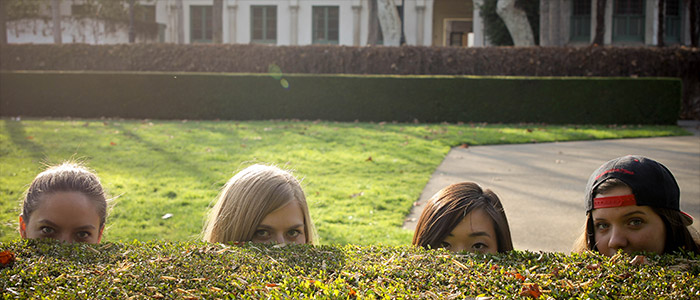
The Golden Antlers (GA) is a satire publication hitting funny bones all across The Claremont Colleges. Founded in 2012 by Clancy Tripp CMC ’15, the website has more than 300,000 views, 1,000 followers on Facebook and Twitter, and a growing staff of 26 writers, four of whom are Scripps students.
Below, Julia Comnes ’16, Teresa Iker ’14, Christie Kweon ’15, and Ellie McElvain ’14 discuss their work with Antlers, campus politics, and being the funniest people on campus.
How did you become involved with the Golden Antlers?
Julia Comnes ’16: I submitted my Scripps application to the Great Application Competition, a contest in which students fill out an Antlers-fabricated application to one of The Claremont Colleges. The staff liked it and suggested that I apply to be a writer.
Christie Kweon ’15: I persuaded Clancy Tripp to hire me as a copy editor by writing her an email touting my “grammar expertise” and “interpersonal skills” – I argued semicolons were “just fancy commas” and promised I would “frequently consult with writers to ensure their articles flow smoother than beer floweth at the first Pub of the semester.”
Ellie McElvain ’14: I also got involved through Clancy. I had heard of the Harvard Lampoon, a campus satire publication that’s a hotbed for budding comedians and writers (alumni include Conan O’Brien), and I wanted to contribute to something similar here.
What’s your favorite contribution to the site? What was the writing process like?
Teresa Iker ’14: I like to keep the articles light-hearted and the jokes spread evenly among the Colleges, and I think the Great Application Competition accomplishes that.
EM: When you write an article that’s just plain mean, it becomes obvious the jokes you’re making are tired and done. They’re bad not because they’re offensive, but because they lack creativity.
TI: The staff is a great litmus; they’ll reject bad jokes and help improve articles overall.
CK: The writing process in general is always really organic. The staff will brainstorm as a group and a preliminary article will be drafted, which will go through either Clancy or me.
EM: It’s really cool to see your ideas generating other ideas.
What role do you think satire publications such as GA play at Scripps and the greater 5C community?
JC: GA makes difficult topics easier easy to digest. The articles are fun to read, but they’re also capable of starting important discussions.
TI: I think satire can be a unifying force for people by making them laugh together. GA brings up the question of what it is we’re actually laughing about.
EM: I believe satire is a powerful tool that can be used for good, such as drawing attention to the deeper roots of a problem. I think the role of a satire publication like GA is to point out things people are uncomfortable to talk about and inspire conversations about them. Especially in a college setting, satire makes the bubble we live in less precious.
CK: I think when we lighten up and laugh at ourselves, we become more open to sincere conversations. Topics like campus culture and school stereotypes become less intimidating when we start to question why they bother us and what we can do about them.
How does GA provide a platform for writers with a funny bone, particularly female writers?
TI: I think it’s a really powerful asset for Scripps student. I love hearing the first-year students talking about GA and how cool it is more Scripps students are getting involved. It’s exciting to go against the stereotype of the boring humorless feminist.
EM: I’ve had students reach out and tell me they were more receptive towards certain GA articles after seeing Scripps students were involved in the writing and editing process; they felt represented.
TI: The first article I wrote was a response to a CMC Forum article that questioned the legitimacy of women’s colleges. I thought it needed a satirical response because it was so outrageous, specifically from Scripps students, because the questions it raised were so relevant to us. As a female writer, it’s important to be involved because it’s actual content generating and editing based on our point of view.
EM: I also got involved because of the Forum article. In that case, GA was a great platform to address the underlying tensions that exist between the Colleges. Just a simple response arguing women’s colleges are legitimate inspires discussion. There’s this stereotype that women can’t take a joke that simply isn’t true. We can take a joke, it just has to be a good one.
Seniors: Do you see yourself doing related work after graduation?
EM: Definitely. I primarily do stand-up, but I also want to write comedy. I’m moving to LA after graduation to pursue a career in the industry, but the truth is that it’s such a lottery. It’s partly hard work and it’s partly total luck. Whatever happens though, humor always has and always will be a significant and important part of my life.
TI: I agree. I got involved in satire writing late in the game, but humor is a facet of my identity and has always underlied everything that I do. I love to write, and if I someday have my own column in a newspaper, I hope my readers find some aspects of my writing humorous.

